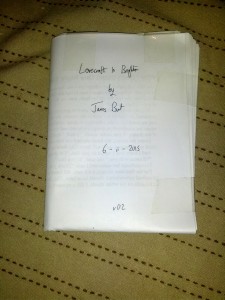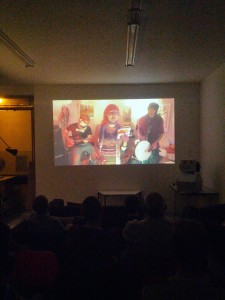(This is the penultimate post from the Literature Network. It was written in 2009 and posted in May 2010 and is one of my favourite pieces from the set. I think it provides a good answer to the question of why people should write in a world where we already have so much text).
James Burt wonders why, with millions of tons of books already in the world, so many of us want to add to the weight.
(James originally wrote this post some months ago and has now returned from his foreign travels. Apologies from the editor for only just finding a space to run this blog post!)
I’m writing this post while boxing up my library. Everything is going into storage while I take a two month holiday. I’m looking forward to relaxing, travelling, and better weather. I’m also excited about reading some good books, something I haven’t had enough time for lately.
I carry a book everywhere I go but it’s only when lugging whole boxes of them that you become aware of how heavy text is. I’ve slimmed my library down massively and it’s still too heavy. I think back to the rumours that my university library is sinking under the weight of the text inside. The story wasn’t true, but it sounds like it could be.
The huge amount of writing in the world feels oppressive. The UK has the highest per-capita number of new titles, with 206,000 published in 2005, an increase of 28% on the year before. That’s more than a life-time’s reading being pumped out year on year. I’d hate to have to carry those books, let alone have to read them. The Internet contains even more text than the world’s books. Wikipedia takes up the equivalent of 1,000 hard-copy encyclopedia volumes. The blogosphere is much larger. There are millions of people writing things on the web.
When blogs first became popular, many people asked what the point was – who cares about the minutiae of regular peoples’ lives? The same sneering continues today, directed at twitter. Critics claim the chatter about TV shows, meals and and dreary days at work is pointless. Why would anyone add to this noise? Doubters often say the same thing to writers: why bother working on a novel/play/story/poem that the vast majority of people won’t even hear about, let alone not care about.
According to some social scientists language didn’t evolve as a means of exchanging information, but rather as a social tool. Social bonding in primates is based on reciprocal grooming, but this takes a fair amount of time. Talking allows people to have a friendly interaction in less time than it would have taken to eat nits from each other’s hair. This is what scientists refer to as ‘phatic communication’, speech intended “to perform a social task, as opposed to conveying information”
Phatic communication is the type of speech where we ask someone how they are, and they tell us they’re fine, a verbal nod from one person to another. It’s why we point out how good the weather is when we meet someone outdoors. With blogging and twitter, the exchange of information is as important as the content of the messages. I think the same is true of creative writing: it performs a social function.
Guardian blogger David Barnett wrote a post asking Is it time to revive the Christmas tradition of the chapbook? Barnett describes giving family and friends copies of Christmas stories he’d written as gifts. He writes “It’s a hugely egotistical exercise, I admit, but no more so than hoping people you know will shell out hard cash for a properly-published piece of fiction. Chapbooks of this kind are homemade, personal and inexpensive – and have an illustrious literary history.”
I love seeing work by friends of mine. There’s something wonderful about a pamphlet or a CD that a friend has put together. As much as the work itself it’s the gift of something they’ve worked on. I think people neglect this phatic aspect of writing. If you’ve finished an amazing story, why not bind a few copies and distribute them? Writing is not simply about the text – or, at least, it shouldn’t be. We should pay more attention to the phatic aspects of creative writing. The presentation of the work is as important as the writing itself.
I’ve now finished packing the books and put them into storage. It’s strange to think of my library boxed and locked away in a room. Books don’t do much good when they’re hidden away.




